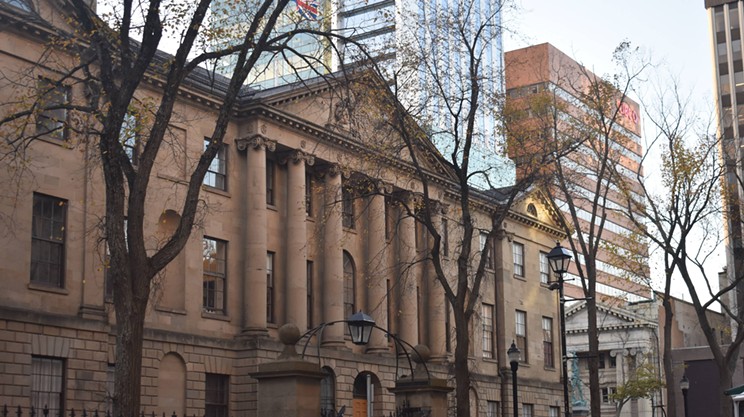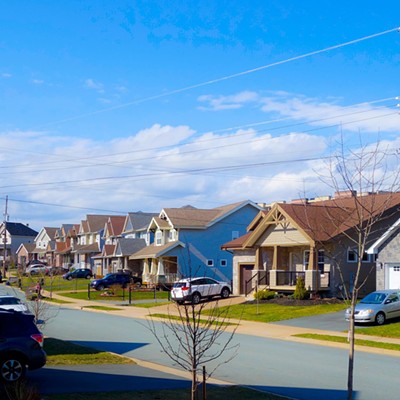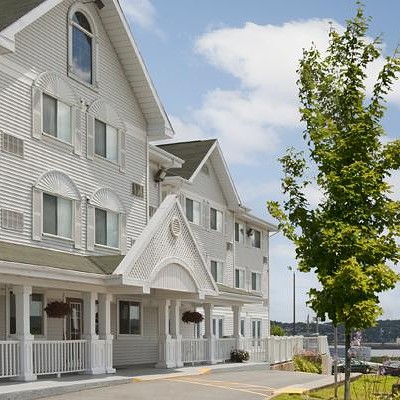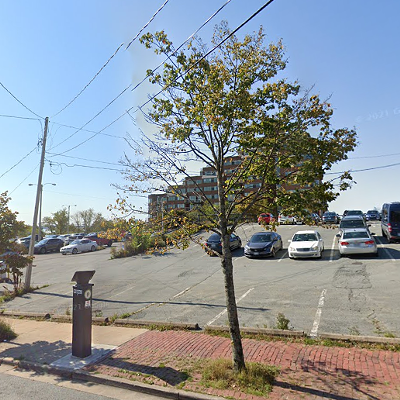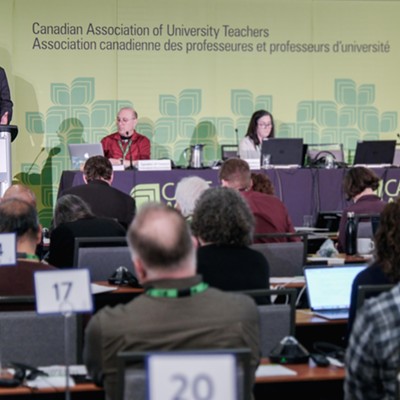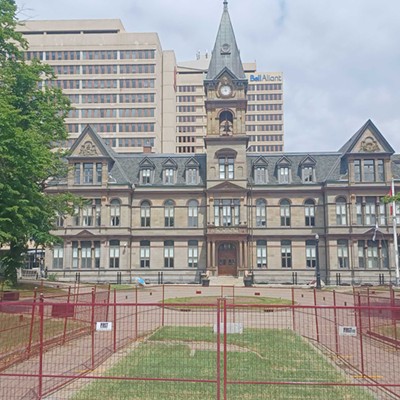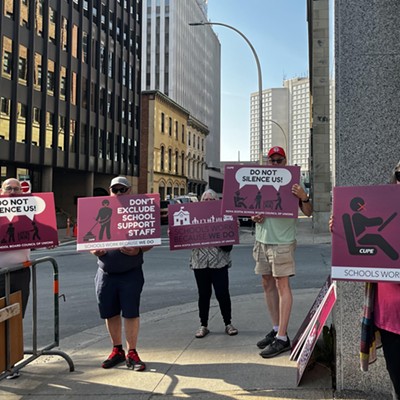Catherine Chase didn’t expect she would have to pick up her life and move by the end of August.
Chase rents a two-bedroom apartment at Prince Edward Estates, owned and managed by Flex Development. She moved in during 2021, and at the time signed a fixed-term lease with the company. This type of lease is typically terminated after the end date, only continuing if both parties agree to it.
When the lease was up and it was time to resign, the property owners instead sent her an email, notifying her of the lease ending. Chase and her roommate would have to be out of their apartment by the end of the summer.
Her only choices are to find an expensive apartment in a city with a 1 per cent vacancy rate, or move back in with her parents. For a 29-year-old working professional who has never been late on rent nor any complaints to her name, she’s shocked that she’s been left in this position.
“It was very short,” she said of the email she received. “[It] doesn’t provide any rationale for why they’re not resigning us.”
Chase said the company used to offer periodic leases—leases which would be either month-to-month or year-to-year that are automatically renewed unless otherwise stated by the tenant. While she has neighbours on periodic leases, when she asked if one could be provided to her, she says the company shot down the suggestion, saying they no longer offer that type of lease.
With Chase on the way out, some of her neighbours who have fixed-term leases are afraid they’ll be next.
“They’re kind of panicking to themselves, thinking, well, is this not just going to happen to them in a few months?” she said.
So, why is this happening? If Chase is such a good tenant, then why would the property owners decide not to renew?
A look at their going rate for apartments might give us an answer. Chase says she pays $1,270 a month in rent. Recent listings for other two bedrooms owned by the same company advertise a monthly rent of $2,400.

According to Rental.ca’s report for June 2024, this nearly matches the average two-bedroom rent in Halifax, which is currently $2,489 per month—a 16.3 per cent increase from last year. One-bedrooms in the city are sitting at an average of $1,925. For a two-bedroom, tenants would be paying nearly $30,000 a year for a property they don’t even own. That’s just over $23,000 for one-bedroom renters—not including utilities.
Flex Development did not respond to a request for comment in time for publication.
‘It’s not keeping tenants housed’
From Chase’s perspective, she is losing her apartment so the company can take advantage of a loophole to bypass the provincial rent cap, which only allows yearly rent increases of up to 5 per cent.
According to Sydnee Blum, a community legal worker with Dalhousie Legal Aid Service, this situation is not uncommon.
“We’re seeing an increase in the use of fixed-term leases because landlords are using them to evict tenants, get around security of tenure, and get around the rent cap,” said Blum. “When you sign a fixed-term lease, a tenant is signing away a lot of their rights, and that includes the right to protection from unfair eviction, and that includes the right to security of tenure and automatic renewal.”
While Blum says there is virtually no circumstance where fixed-term leases are beneficial to tenants, others disagree.
The Investment Property Owners Association of Nova Scotia (IPOANS) represents more than 160 members who own upwards of 50,000 properties provincially. Their executive director, Kevin Russell, submitted a statement to the provincial Law Amendments Committee on March 25, where he argues provincial rent caps and other methods of curbing the housing crisis have caused “suffering” for landlords.
“The parties you represent have created the housing crisis and policies like rent control are making the housing crisis worse and resulting in more homelessness,” he said.
Russell also spoke of fixed-term leases: “Getting rid of, or restricting, fixed-term leases will mean less housing for students, newcomers, seniors and vulnerable Nova Scotians,” adding, “Bad ideas like more rent control and restricting fixed term leases aren’t solutions to the housing crisis.”
Russell points towards a study undertaken by IPOANS, where between April 18-26, 2023, 208 rental housing providers were surveyed. The survey results state 55.6 per cent of fixed-term leases are for first time renters, and that 87.24 per cent are being used for other reasons besides to dodge the rent cap.
Rather, the reason they use these leases, according to the survey results, is for risk management, allowing time to develop the tenant relationship, first time renters, limiting property damage, and lack of tenant credit history.
While Russell claims this data is proof that fixed-term leases are helpful, the study only looks at responses from property owners—those who benefit from fixed-term leases. Tenants were not consulted for this study.
Blum certainly doesn’t buy IPOANS' stance on the matter.
“There is no real evidence to show that signing fixed-term leases keep tenants in housing long term,” she said. “By definition, a fixed-term lease removes a tenant’s security of tenure and therefore doesn’t entitle them to continue renting the unit.
“In our opinion, this is not creating more long term housing. It’s not keeping tenants housed in the slightest. If anything, we’re seeing a constant cycle of tenants evicted on fixed-term leases, really without cause.”
When asked what possible solutions the provincial government could take on to help curb the use of fixed-term leases, Blum suggested looking at either a total ban or automatic renewal for fixed-term leases.
“What the government’s doing by not taking action on this is effectively allowing landlords to subvert laws and rights protecting tenants in the Residential Tenancy Act,” she said.
Losing a community
Chase has become very close to several of her neighbours during the time she’s spent in her building. She says a small community has formed there, including friends who also live in the building and fellow tenants who she gets along with.
Now, that’s all being ripped away from her.
“This situation has made me feel very powerless,” Chase said. “I have never felt more vulnerable than I have being put in this situation.”
Chase reached out to her elected officials to tell them her story, including Municipal Affairs and Housing Minister John Lohr.
An interview request with Lohr, passed onto Service Nova Scotia Minister Colton LeBlanc, was declined by Communications Nova Scotia, but spokesperson Geoff Tobin provided a statement on fixed-term leases.
“We understand the housing crisis is creating stress and worry for many Nova Scotians, including those on fixed-term leases,” reads the statement.
“Fixed-term leases were created for a reason: to support people like students and those working a short-term job, who only needed a place to live for a set period of time.”
The statement says the only real solution to the housing crisis is more housing, and that the province is attempting to “find balance as much as possible” while increasing housing supply. It also notes any residents who feel their rights aren’t being respected apply to the Residential Tenancies Program to help resolve any issues.
The statement does not acknowledge the role fixed-term leases have had in property owners avoiding the 5 per cent annual rent cap by not renewing lease agreements with current tenants.
However, Chase feels reaching out to representatives, whether local or provincial, can perhaps help move the conversation forward.
“I think it’s really important that we share these experiences and speak out on them,” said Chase. “[Politicians] are supposed to represent us, so if they don’t know the challenges that we experience, or what policy is influencing that, then they might not know to vote on certain items differently.”
For now, Chase will have to continue browsing for an apartment within her means—and even then, she may have to sign onto another fixed-term lease despite her hesitancy.
“I will not move in on a fixed-term lease if I can avoid it, because… how do you expect people to live?”
A previous version of this article stated it was Minister Lohr who declined an interview. As clarified by Communications Nova Scotia, the interview request had been redirected to Minister LeBlanc, who deals with the Residential Tenancies Act, and was then declined.


